iStudy for Success!
Online learning tutorials for essential college skills.
Testing and Assessment
iStudy would like to acknowledge Patricia Nordstrom for revising the content of this tutorial.
Purpose
 Have you ever felt like your total academic experience is just one long test? Do you study materials that you are interested in learning about? Or do you simply study so you can pass the next test - and the next test - and the next test? Are you looking forward to graduation just so you don't have to take any more tests? Have you ever considered why testing is important?
Have you ever felt like your total academic experience is just one long test? Do you study materials that you are interested in learning about? Or do you simply study so you can pass the next test - and the next test - and the next test? Are you looking forward to graduation just so you don't have to take any more tests? Have you ever considered why testing is important?
This tutorial provides information about testing, assessment, and evaluation. As you work through the materials you will find examples of different types of assessments, as well as what they are intended to measure, and strategies for studying and completing them successfully. You will also learn skills that will help you with your professional career by assisting you in becoming a lifelong learner.
Goals and Objectives
The main goal of this tutorial is for you to learn how to get the most out of assessment, evaluation, and testing opportunities. Upon completion of this tutorial, you will be able to:
- State the differences between tests, assessments, and evaluations
- Determine if you have confidence in your ability to learn
- Understand why developing lifelong learning skills is important to your professional success
- Explain why testing, assessing, and evaluating your progress and understanding is important to both your academic and professional career
- Explain different types of assessments and what they measure
- Apply appropriate study strategies to the different types of assessments
- Use electronic testing tools to improve your study and assessment skills
- Identify strategies to use when completing electronic tests and assessments
- Apply appropriate strategies for coping with assessment challenges
- Identify academic integrity issues associated with assessment
Reading
To learn more about testing and assessment, read about the following:
- Differences between testing, assessment, and evaluation (definitions of test or quiz, assessment and evaluation and the importance of assessment)
- What should you know prior to a test? (things you should find out from your instructor for better test preparation)
- Different types of assessments (tips for preparing for and completing various forms of assessments, including open book exams, interviews and oral exams, math exams, research papers, and class projects)
- Different types of questions (tips for preparing for and completing various types of exam questions, including multiple-choice, true-false, essays, short-answer, fill-in-blank, matching)
- Informal classroom assessment (purposes of different informal classroom assessments, including concept mapping, minute papers, discussion boards/blogs/wikis)
- Alternative assessments (introduction to portfolio assessment and case studies)
- Electronic testing (introduction to eTesting Center and ANGEL quizzing)
- General tips for preparing to take tests and quizzes (additional tips for test preparation, including organizing notes and electronic materials)
- Academic integrity (the importance of academic integrity)
Note: All external links in this tutorial will open in a new window or tab.
Reflective Activity
References
Summary
Instructor's Guide
Differences between Testing, Assessment, and Evaluation
What Do We Mean by Testing, Assessment, and Evaluation?
When defined within an educational setting, assessment, evaluation, and testing are all used to measure how much of the assigned materials students are mastering, how well student are learning the materials, and how well student are meeting the stated goals and objectives. Although you may believe that assessments only provide instructors with information on which to base a score or grade, assessments also help you to assess your own learning.
Education professionals make distinctions between assessment, evaluation, and testing. However, for the purposes of this tutorial, all you really need to understand is that these are three different terms for referring to the process of figuring out how much you know about a given topic and that each term has a different meaning. To simplify things, we will use the term "assessment" throughout this tutorial to refer to this process of measuring what you know and have learned.
In case you are curious, here are some definitions:
- A test or quiz is used to examine someone's knowledge of something to determine what he or she knows or has learned. Testing measures the level of skill or knowledge that has been reached.
- Evaluation is the process of making judgments based on criteria and evidence.
- Assessment is the process of documenting knowledge, skills, attitudes and beliefs, usually in measurable terms. The goal of assessment is to make improvements, as opposed to simply being judged. In an educational context, assessment is the process of describing, collecting, recording, scoring, and interpreting information about learning.
Why is Assessment Important?
Hopefully by this point in your life you have discovered that learning can be fun! You have probably also realized that you are constantly learning, whether you are in a classroom, a car, or a kitchen.
Assessment helps you build confidence in your ability to learn.
Perhaps you have heard that the global work culture is changing. Unlike your grandfather, you will probably have a number of different jobs and careers during your lifetime. In order to be successful, you will need to have confidence in your ability to learn and you will need to become a lifelong learner. Assessment plays a key role in developing your confidence in your ability to learn, as well as in developing your lifelong learning skills.
[top of page]
Student Dialog - Learning to Bake Cookies
Jose: Hi, Brian. What's in the bag?
Brian: These are my world famous chocolate chip cookies. Here, try one.
Sage: Hey guys! What'cha doing?
Jose: Brian made some cookies. Here, try one.
Sage: Wow, Brian! These are great. How did you learn to make these?
Brian: I used to help my mom bake cookies when I was a kid. Then, when I came to college, I brought the recipe with me and started making them for myself. At first they didn't turn out very well, but the more I practiced, the better I got. I have even made some changes to the recipe that I think have improved the taste.
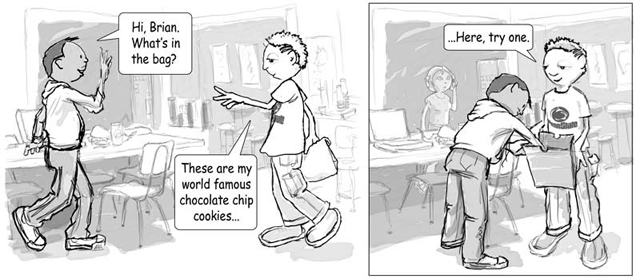
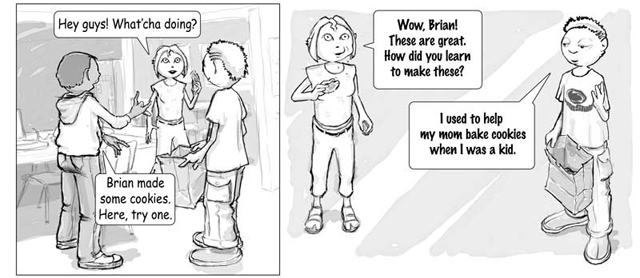
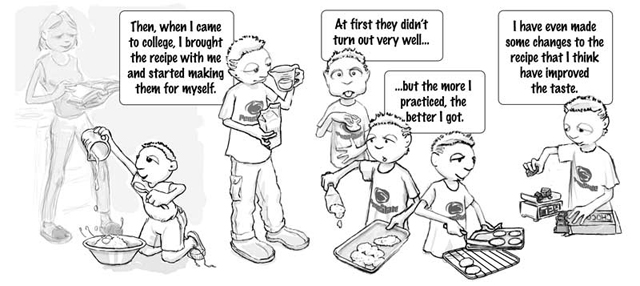
[top of page]
You may be thinking that learning to bake cookies and learning something like chemistry aren't the same at all, and, in a way, you are right. But, the information you get from assessing what you have learned is the same. Brian used what he learned from each batch of cookies to improve the next batch. You learn from every homework assignment you complete and every quiz you take what you still need to study in order to know the material.
Another really good way to understand the importance of assessment is to think about learning skills. When playing basketball, for example, you get immediate feedback about how well you are doing, and this tells you how to adjust to get the ball in the hoop next time. When you are learning a skill, feedback (assessment) is automatic. When you are learning chemistry, the feedback process needs to be made visible through assessment.
Assessment doesn't have to be a written exam. You can determine if you have successfully learned something in a number of different ways, depending on what you are trying to learn. Recognizing that there are many different ways to assess learning and becoming skillful at self-assessment are important lifelong learning skills.
What Should You Know Prior to a Test?
In classes, assessment determines if you are learning what your instructor thinks is important.
When you are taking a course and the instructor announces that there will be a test or quiz, what's the first thing you ask? If you are like most students, you want to know what will be on the test. You determine what's important to study and learn from knowing what is on the test. Your instructor uses assessment to guide your learning and to communicate and reinforce what is important to learn. However, any test is limited in its ability to assess all important information. Thus, the questions on a test are a sample of the information that the instructor wants you to know. If you study effectively, you will be prepared to answer most questions on the subject and therefore answer most questions from the subset that makes up the test.
Tips on What to Ask About a Test
- Ask what content will be covered on the test
- Ask what types of questions will be on the test
- Ask if each question will have just one correct answer or if you will need to select all answers that apply
- Ask how many questions there will be and how much time you will have to complete the test
- Ask about the criteria the instructor will be using to grade the exam. Will the instructor take off points for spelling and grammatical errors? If the test will contain essay questions, how much prior knowledge is assumed? Will the instructor allow you to turn in whatever prewriting or drafts you do, as well as the revised version of the essay?
Student Dialog - Assessment is Just Part of The Learning Process
Heather: Look at this syllabus, Sage! I have a quiz EVERY DAY in Spanish! I think this instructor has really lost it!
Sage: Calm down, Heather. Why does it bother you to have to complete a quiz every day? At least she's telling you in advance what to expect instead of giving pop quizzes.
Heather: It bothers me because…. Well, because…. OK, I can see this is going to sound really stupid. It bothers me because it means I will have to study every day to prepare for the quiz the next day.
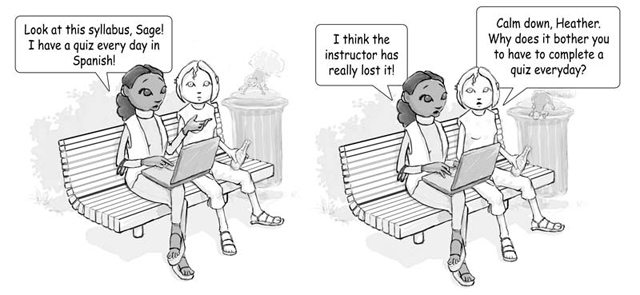
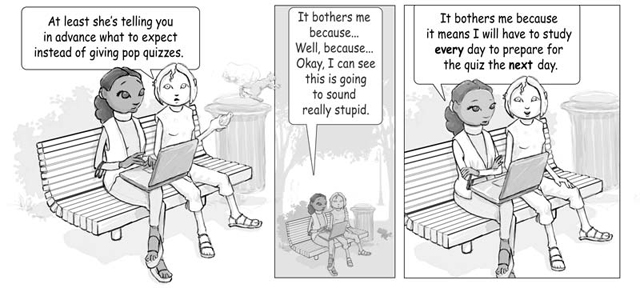
[top of page]
Research has confirmed that the act of testing actually improves learning. For example, let's say that after a lecture one day the instructor gives a test to half the class and no test to the other half. Then the instructor tests the entire class the next week. The half who was given the first test will score higher than the other half of the class that was not. Research has also shown that frequent testing improves learning because it allows students to focus on smaller amounts of information at a time.
Types of Assessments
Assessments can be delivered in a variety of ways. Don't assume one is easier than another, although the way you study might differ depending on the type of assessment. You need to prepare for all assessments, no matter what the delivery method is.
Conventional Exams
Typical exams are delivered in a proctored classroom setting with a specific period of time to complete a variety of questions and question types. This type of exam is usually "paper and pencil" but could also be delivered via an electronic device like a computer.
Open Book Exams (completed in class)
Open book exams may consist of many different question types. Because you are given the opportunity to consult print resources, expectations may be higher for answers to contain more detail and be more complex in their analysis of the question or statement. It is very important to pay special attention to directives in open book exams. If the exam is an open book math assessment, you will be expected to show detailed work as to how they reached their solution to the problem. If the exam is primarily or completely essay, you may be expected to use quotes, cite sources, and provide more details.
In an open book exam you will likely be evaluated more on understanding than on recall and memorization. Open book exams test your ability to find and use information for problem solving and to deliver well-structured and well-presented arguments and solutions. You may be expected to apply material to new situations, analyze elements and relationships, and demonstrate that you have synthesized the material through the structure of your answer and how well you have provided supporting evidence for your answer.
Terms & Directives
Directives ask you to answer or present information in a particular way. For a list of words and explanations, see Study Guides and Strategies, essay terms.
Tips for Preparing for Open Book Exams
- Stay current on readings and class assignments.
- Prepare brief, concise notes on ideas and concepts being tested.
- Carefully select what you intend to bring with you to the exam.
- Challenge yourself with how you would answer questions, and what options and resources you may need to consider.
- Pre-write answers to questions you anticipate might be on the exam and include your own commentary on the information that will provide fuel for your arguments and demonstrate that you have thought through the materials.
- Organize your reference materials:
- Make your reference materials as user-friendly as possible so that you don't lose time locating what you need.
- Familiarize yourself with the format, layout and structure of your textbooks and source materials.
- Organize textbooks and source materials with your class notes for speedy retrieval and index ideas and concepts with pointers and/or page numbers in the source material.
- Develop a system of tabs or sticky notes, color coding, concept maps, etc. to mark important summaries, headings, and sections.
- Write short, manageable summaries of content for each grouping.
- List data and formulas separately for easy access.
Tips for Taking Open Book Exams
- Read the questions carefully to understand what is expected.
- Quickly review the number of questions and note how much time each could take.
- First answer the questions that you are confident about and/or that will not require much time to check the resources.
- Leave more complex and difficult questions for later.
- Aim for concise, accurate, and thoughtful answers that are based on evidence.
- to illustrate a point or act as a discussion point.
- to draw on the authority of the source.
- when you can not say it better in your own words.
- A reference to a quote may be as effective as the quote itself.
- Guard against overquoting – extensive quoting may detract from your point or argument.
[top of page]
Open Book Exams (Take-Home)
When you are given a take-home exam, you will have more time to complete it compared to an in-class exam, but you still need to study and prepare by organizing your materials and resources. Take-home exams are often graded more stringently than in-class exams because you do have more time to complete your work. You will need to pay special attention to details and organization, as well as to directives.
If your instructor doesn't specifically address it, ask if you are allowed to work on the exam with others or if you are to work alone. Working together on an exam that you are expected to complete individually is cheating.
Tips
To prepare for and complete an open book take-home exam, you will need to follow the same tips as for the in-class open book exam. Since you will have more time to complete the take-home exam than you would for an in-class open book exam, here are some additional tips for completing the exam:
- Take notes as you look through your materials for information about each question, then summarize what you find, writing down precisely where you found it.
- Use index cards for taking notes just as you would for a research paper.
- Make an outline for each answer.
- Write your answer by following the outline and looking up materials as you go.
[top of page]
Interviews and Oral Examinations
A formal assessment conducted through an interview or oral exam consists of a series of questions, which may include having you perform tasks or solve problems. You demonstrate your understanding of the concepts by answering questions and performing the requested tasks.
Oral exams give you an opportunity to practice your speaking and communication, both of which are needed during job interviews. Oral exams can include both prepared presentations where you are assigned a topic in advance, and more informal question-and-answer sessions where you need to know the content but don't need to prepare a formal presentation.
Preparation Tips
- Write out questions you anticipate will be asked.
- Write out possible follow up questions to your answers. Although content is typically set before the exam, questions asked during the exam are usually dynamic, based on your answers.
- Practice answering questions with classmates. Encourage classmates to ask follow up questions.
- Practice in front of a mirror to evaluate your delivery.
- Make a video recording of your practice session. When reviewing the recording, look for things in your delivery that you could improve.
- Avoid "verbal tics" like the phrases, "you know" or "OK, so" in the content of your answers.
- If you are using some form of technology during your exam, practice with the equipment the day before. If possible, test the equipment in the setting where it will be used.
- If you are using technology equipment during your exam, arrive early to the exam site to set up and test the equipment.
During the Exam
- Dress, look, and act professionally.
- Turn off your cell phone.
- Arrive at the location early so you have a chance to collect your thoughts before beginning.
- Carefully follow any directions you have been given for the exam, such as begin by introducing yourself, bring handouts, etc.
- Maintain good posture and make eye contact with the audience.
- Listen carefully to the questions you are asked. If you don't understand, ask for clarification.
- Stay focused. Pause and think about your answer before you start to speak. Don't ramble.
- Speak in complete sentences and elaborate on your answers. Avoid one- and two-word answers.
- When you are finished, thank your audience.
[top of page]
Math Exams
Math exams usually require students to complete math problems. Expect to be asked to show your work. Question types can vary from matching, to multiple-choice, to completion.
Preparation Tips
- Attend class and stay current with homework problems.
- As you work practice problems, be sure you understand the process.
- Work practice problems on your own first before checking the answer.
- If available, study a copy of the same instructor's previous exams.
- Form a study group to meet weekly to discuss homework problems.
- Carefully read the instructions for the exam.
- Read through the exam questions.
- If you are asked to show your work, write neatly and show each step clearly.
- Complete the easiest problems first.
- Read each question carefully and make sure you are answering the actual question.
- If you get stuck on a problem, move on and come back to it.
- If you are using a calculator, recheck your math immediately.
- If you aren't using a calculator, recheck your math if you have time.
[top of page]
Research Papers
Research papers are often assessed. Here's a good definition [by the Department of English at Purdue University] of a research paper:
"A research paper is a piece of academic writing that requires a more abstract, critical, and thoughtful level of inquiry than you might be used to…….Writing a research paper involves (1) first familiarizing yourself with the works of "experts"--for example, on the page, in cyberspace, or in the flesh through personal interviews--to build upon what you know about a subject and then (2) comparing their thoughts on the topic with your own." (Research Papers: What is a Research Paper? (n.d.). Retrieved September 3, 2012, from http://owl.english.purdue.edu/workshops/hypertext/ResearchW/what.html)
In a research paper you combine what you know with what you learn, integrating your personal thoughts and insights.
There are several different types of research papers:
- A review of the literature in a field: research information and then summarize and paraphrase it.
- A paper that analyzes a perspective: break a topic or concept down into its parts and then restructure those parts in a way that makes sense to you.
- A paper that argues a point: use information to support your stance on an issue.
Perparation Tips
- Read the assignment carefully. Ask for clarification if there is something you don't understand.
- Ask for the grading criteria.
- Create a timeline for completing the paper by working backwards from the due date. Allow adequate time for each step of the writing process.
- Follow any directions you have been give about how to cite your sources. If you haven't been given directions, ask if there is a specific format you are to follow.
- There are many helpful guides for writing research papers available on the Internet. For example, A Research Guide for Students Website contains information about the different steps you can follow as well as a plethora of additional helpful information. If you instructor doesn't give you specific resources to use or steps to follow, consider using this site as a guide or find a different site that meets your needs.
[top of page]
Class Projects
Class projects can take a variety of forms. They are also a way to assess what you have learned. Usually, instead of writing answers to questions, you have to produce something that will be graded based on specific criteria. The grading criteria are often organized in a rubric. You can visit the University of Wisconsin's Rubric Website for exemplar rubrics.
Working in Class Projects Tips
Because the term "class project" is so broad, it's hard to give specific tips, but here are a few that apply to projects in general:
- Make sure you understand the assignment. Ask for clarification if necessary.
- Make sure you understand the grading criteria. Ask for clarification if necessary.
- Don't procrastinate. Get started as quickly as possible.
- Make a plan by sequencing the tasks on a timeline, starting at the due date and working backwards.
- If you are working in a group, make sure everyone understands what the project is, what his or her role in completing the project is, and when his or her deliverable is due.
- Don't let your team members down – do your part and complete it on time.
Types of Questions
In order to prepare properly for a test, you will need to ask not only what the content for the test will be, but also which types of questions the test will contain. Different question types require different study strategies. Listed below are descriptions of a number of different question types as well as study and preparation strategies for each.
Multiple-Choice
 Multiple-choice tests usually consist of a question or statement to which you respond by selecting the best answer from among a number of choices. Multiple-choice tests typically test what you know, whether or not you understand (comprehension), and your ability to apply what you have learned (application). Some questions might assess your ability to analyze or evaluate information, but these kinds of questions are difficult to write so they aren't common on multiple-choice exams.
Multiple-choice tests usually consist of a question or statement to which you respond by selecting the best answer from among a number of choices. Multiple-choice tests typically test what you know, whether or not you understand (comprehension), and your ability to apply what you have learned (application). Some questions might assess your ability to analyze or evaluate information, but these kinds of questions are difficult to write so they aren't common on multiple-choice exams.
There are no special tricks for studying for multiple-choice exams. General study skills apply:
- Stay current with assignments.
- Review your notes after each class.
- Schedule regular study sessions.
- Indentify materials you don't understand and ask questions.
- Form study groups to share notes and check each other's understanding.
- Create your own multiple choice questions about the content for practice.
Tips for Taking Multiple-choice Exams
- Read the question or statement carefully.
- Try to answer the question in your head before reading the answer choices.
- Read all of the answer choices carefully.
- Eliminate answers you know are incorrect
- If you know more than on answer is correct, consider if "all of the above" is possibly the correct choice.
- If "all of the above" isn't a choice, or isn't the correct choice, then select the BEST answer from those you think are correct.
- Never leave a multiple-choice question blank unless you are penalized for guessing. If you don't know the answer, eliminate the ones you know are not correct and then make an educated guess.
[top of page]
True-False
 True-false tests contain statements that the student marks as being either true or false. In order to qualify as true, all parts of the statement must be true. In general, true-false tests check your knowledge of facts. Again, general study skills and best practices apply to studying for true-false tests.
True-false tests contain statements that the student marks as being either true or false. In order to qualify as true, all parts of the statement must be true. In general, true-false tests check your knowledge of facts. Again, general study skills and best practices apply to studying for true-false tests.
Tips for Responding to True-false Questions:
- Every part of a true sentence must be "true."
- Read each statement carefully and pay close attention to negatives, qualifiers, absolutes, and long strings of statements.
- Qualifiers like "never," "always," and "every" mean that the statement must be true all of the time. Usually these types of qualifiers lead to a false answer.
- Qualifiers like "usually, sometimes, and generally" mean that if the statement can be considered true or false depending on the circumstances. Usually these types of qualifiers lead to a true answer.
- If any part of the question is false, then the entire statement is false, but just because part of a statement is true doesn't necessarily make the entire statement true.
[top of page]
Essay
 Essay questions require students to write answers to statements or questions. To complete a successful essay exam, you need to be able to recall relevant information and to organize it in a clear way, generating a thesis and building to a conclusion. Instructors give essay tests to determine whether or not students can make connections among various ideas, apply course information to new situations, and (most importantly) demonstrate that they have made the information their own.
Essay questions require students to write answers to statements or questions. To complete a successful essay exam, you need to be able to recall relevant information and to organize it in a clear way, generating a thesis and building to a conclusion. Instructors give essay tests to determine whether or not students can make connections among various ideas, apply course information to new situations, and (most importantly) demonstrate that they have made the information their own.
Essay exams are a useful tool for finding out if you are able to sort through a large body of information, figure out what is important, and explain why it is important. Essay exams challenge you to come up with key course ideas and put them into your own words using the interpretive or analytical skills you've practiced in the course. Essay questions are typically used to assess your ability to analyze or evaluate material, as well as to create (synthesize) new material based on your knowledge.
You should pay close attention to the words in the question or statement, called directives, which tell you exactly what is expected in your answer.
Directives
Directives ask you to answer or present information in a particular way. For a list of words and explanations,
see Study Guides and Strategies, essay terms.
Tips for Preparing for an Essay Exam
- List all topics you expect to be on the test, including key topics covered in class and in the readings. List important subtopics for each.
- Organize your notes and readings around the list of topics and review all the materials to be covered.
- For each topic and subtopic, specify who, what, where, when, how, and why.
Tips for Taking Essay Exams
- Read through the questions once and note if you have any choice in answering questions or if you are to answer only some of the questions
- Pay attention to how the question is phrased and to the "directives," words such as "compare," "contrast," "criticize," etc.
- Answers will come to mind immediately for some questions.
- Jot down thoughts, ideas, and keywords as you read each question.
- Set up a time schedule to answer, review, and edit all questions.
- If six questions are to be answered in sixty minutes and are all of equal difficulty and value, allow yourself only seven minutes for each.
- If questions are "weighted," prioritize that into your time allocation for each question. When the time is up for one question, stop writing, leave space below your answer (if it is a pencil and paper exam), and begin the next question. Incomplete answers can be completed during the review time.
- Before attempting to answer a question, put it in your own words then compare your version with the original. Do they mean the same thing? If they don't, you've misread the question. You'll be surprised how often they don't agree.
- Focus on what you DO know about the question, not on what you don't know.
- Make a brief outline for each question.
- Number the items in the order you will discuss them to be sure you don't miss any part of the question.
- Get right to the point.
- Use words from the question in your answer.
- Begin with a strong first sentence that states the main idea of your essay.
- Use your first paragraph to provide an overview of your essay and present your key points.
- Use the rest of your essay to discuss these points in more detail.
- Back up your points with specific information, examples, or quotations from your readings and notes.
- Make sure you answer everything the question is asking.
- Instructors/graders are positively influenced by compactness, completeness, and clarity of an organized answer.
- Writing in the hope that the right answer will somehow turn up is time-consuming and usually futile.
- To know a little and to present that little well is, by and large, superior to knowing much and presenting it poorly – the former will generally earn you a better grade.
- Begin each paragraph with a key point from the introduction.
- Develop each point in a complete paragraph.
- Use transitions, or enumerations, to connect your points.
- Keeep your time limit in mind.
- It is better to write "toward the end of the 19th century" than to say "in 1894" when you can't remember, whether it's 1884 or 1894. In many cases, the approximate time is all that is wanted; unfortunately 1894, though approximate, may be incorrect, and will usually be marked accordingly.
- Summarize in your last paragraph:
- Restate your central idea and indicate why it is important.
- Complete any questions left incomplete.
- Allow time to review all questions.
- Edit and correct misspellings, incomplete words and sentences, and miswritten dates and numbers.
- Outline the answers to the questions you don't have time to finish.
[top of page]
Short-Answer
 Short-answer questions or statements are similar to essay questions, except they can be answered with just a few words or sentences. They test foundational knowledge which is usually factual. When completing short-answer questions, it's important to pay attention to the directive words in each item.
Short-answer questions or statements are similar to essay questions, except they can be answered with just a few words or sentences. They test foundational knowledge which is usually factual. When completing short-answer questions, it's important to pay attention to the directive words in each item.
Tips for Preparing for Short-answer Exams
- Create flash cards with key terms, dates, and concepts on the front and definitions, events, and explanations on the back.
- Develop summary sheets of the course materials.
- Focus on key words, events, vocabulary, and concepts.
- Organize your notes and materials around the key words, events, vocabulary, and concepts you have identified.
Tips for Taking Short-answer Exams
- Read the question carefully and make sure you answer everything that is requested.
- When answering questions, respond directly to the question or directive focusing on keywords and ideas.
- Write concise answers presenting key facts in short sentences according to the test instructions.
[top of page]
Fill-in-the-blank
 Fill-in-the-blank items, also known as completion questions, provide students with a partial sentence or question and then require them to write the word (or words) in the blank that best completes the statement or question. Fill-in-the-blank and short-answer questions test your ability to recollect facts you have learned.
Fill-in-the-blank items, also known as completion questions, provide students with a partial sentence or question and then require them to write the word (or words) in the blank that best completes the statement or question. Fill-in-the-blank and short-answer questions test your ability to recollect facts you have learned.
Tips for Preparing for Fill-in-the-blank Exams
- As you organize and review your class notes, underline new terms, important dates, noteworthy phrases, and the names of key people.
- Review readings and other materials in the same manner; underline important information and put parenthesis around key sentences.
- Make lists or flash cards of the information you have identified to study.
Tips for Taking Fill-in-the-blank Exams
- Read each question or statement carefully, picking up clues about the answer from the wording of the question.
- Completion questions test facts and basic knowledge, so don't overanalyze the question.
[top of page]
Matching
 To complete a matching assessment activity, you must select one item from each of two columns. The two items must fit together correctly based on the assessment directions.
To complete a matching assessment activity, you must select one item from each of two columns. The two items must fit together correctly based on the assessment directions.
Tips for Taking Matching Exams
- Read the directions to see if only one match is allowed per item.
- Carefully read all of the choices.
- Determine if what is being asked for is a person, place, thing, etc.
- Answer the items you are sure of first.
- If necessary, check off items as you use them.
Informal Classroom Assessment
Student Dialog - Informal Classroom Assessment
Cathy: Hi, Rebecca. Haven't seen you for a while. How's going with your classes this semester?
Rebecca: Hi, Cathy. I am doing fine. I just had my psychology class earlier.
Cathy: How was it? You don't sound happy when you mentioned about it.
Rebecca: Well. My instructor asks us to write a one-minute paper at then end of each class session. I don't really like it. I just want to go home after listening to a three-hour lecture.
Cathy: Actually, I quite like the idea.
Rebecca: No, Cathy. You must be kidding.
Cathy: I think the one minute paper activity is a type of informal assessment which will provide your instructor an opportunity to check the clarity of her lesson on that day. In addition, you are also given an opportunity to work with the concepts and terms from the class lesson, and generate a summary.
Rebecca: You are right, Cathy. I never thought about it.
Cathy: Taking my instructional design class as an example. We are required to maintain an individual Weblog to reflect on our thinking about learning, instruction and design throughout the semester.
Rebecca: You may also use it as a platform to communicate with your classmates or to share useful resources and references with others.
Cathy: Rebecca, I am glad you've realized the benefits of the informal classroom assessment now.
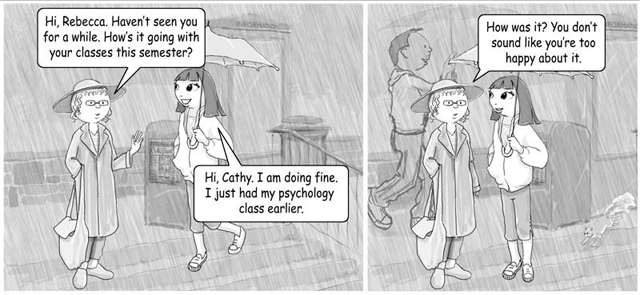
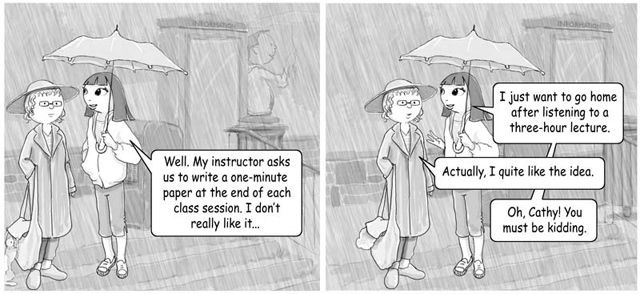
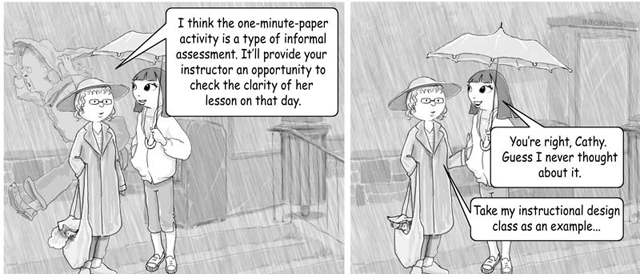
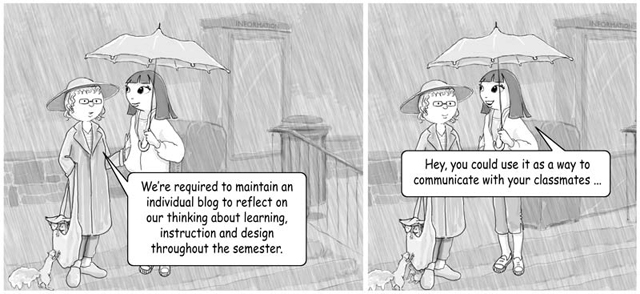
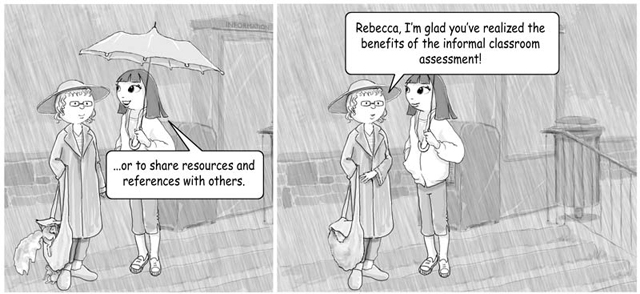
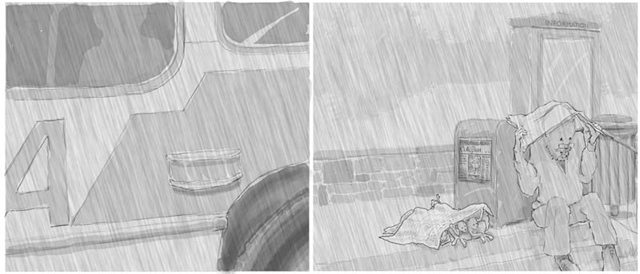
[top of page]
Informal assessment generally includes activities that can easily be incorporated into classroom routines. They can be used at anytime without interfering with instructional time. Informal assessment gives you an idea of how much you understand the material and seeks to identify your strengths and needs without regard to grade or age norms.
Concept Mapping
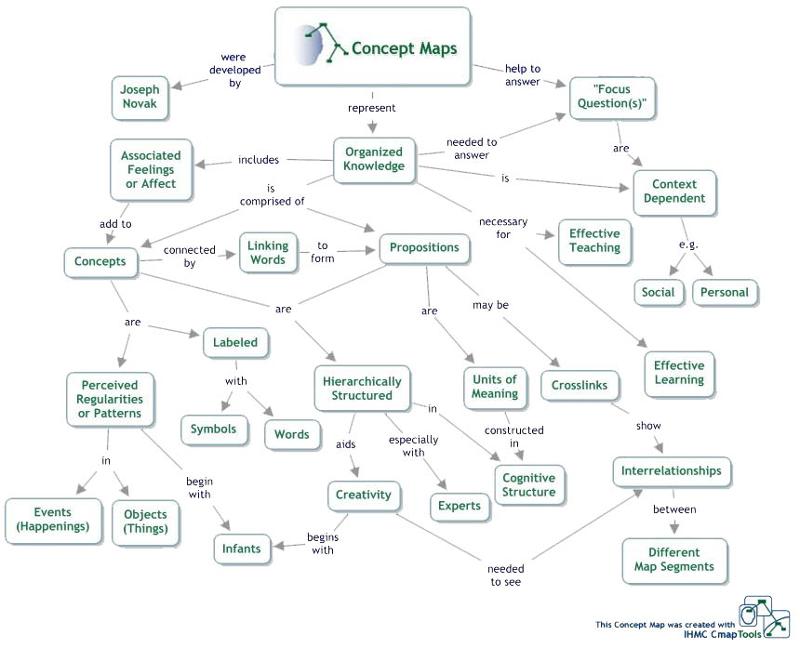 A concept map is a diagram made up of nodes or cells containing a concept, item, or question, as well as labeled links. They show the relationships between ideas and concepts, resulting in a graphical representation of knowledge. Concept maps can be used for brainstorming and communicating complex ideas.
A concept map is a diagram made up of nodes or cells containing a concept, item, or question, as well as labeled links. They show the relationships between ideas and concepts, resulting in a graphical representation of knowledge. Concept maps can be used for brainstorming and communicating complex ideas.
As an assessment tool, concept maps are often used to evaluate your understanding of complex relationships. The more you know about a topic, the more complex your map will be. Concept maps can also be used as a study tool to help you identify how concepts fit together and then evaluate where you have gaps in knowledge.
For more information on concept maps, check out the Concept Mapping iStudy tutorial.
Minute Papers
In a basic minute paper, the instructor takes the last minute of class and asks you to write down short answers to one or two questions. For example:
- What was the most important point made in class today?
- What was least clear in this lecture?
- What unanswered questions do you still have?
Minute papers help instructors assess what you have learned during a given class. When used for feedback, minute papers aren't usually graded and may even be submitted anonymously. Sometimes minute papers serve the dual purpose of collecting feedback and taking class attendance, in which case they wouldn't be anonymous.
The best way to prepare for a minute paper is to pay attention in class, take good notes, and, as material is presented, note any questions you may have. If your instructor uses a minute paper, it means he or she is interested in knowing what you understand from the material presented. Don't be afraid to let your instructor know which concepts in the day's presentation confused you. Your instructor will adapt his or her teaching based on your responses. That is, he or she may re-teach concepts that you are still unclear about and/or not spend any more time on concepts that the class clearly understands already. Thus, completing these assignment can honestly only help you.
Discussion Boards/Blogs/Wikis
Discussion boards, blogs, and wikis are all electronic, text-based, Web-based communication spaces. When used for assessment, students are usually expected to write about specific class-related topics and interact and discuss those topics with each other using the electronic space. The instructor should provide information about how the discussions will be graded. Assessment criteria often includes how many posts a you have made, how many times you replied to other posts, the quality of the posts you made, and how well you contribute to developing the discussion. Depending on the class, grammar, punctuation, spelling, sentence structure, and other writing skills may also be part of the assessment.
You will most likely need to plan some time to learn how to use the discussion board, blog, or wiki. Using a word processor to plan, organize, and develop your posts prior to entering them into the discussion board, blog, or wiki is also recommended. Just like any other assessment, you will need to review the class materials, organize your notes, and organize your thoughts in advance.
Discussion Board Rubrics
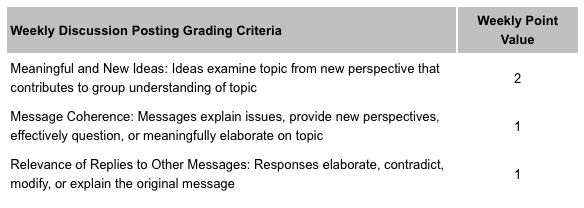 Rather than being a form of assessment, a rubric is a set of criteria and standards linked to learning objectives that is used to assess a student's performance on papers, projects, essays, and other assignments. A rubric consists of a set of scoring criteria and point values associated with those criteria. In most rubrics the criteria are grouped into categories so the instructor and the student can discriminate among the categories by level of performance. Each level of performance is given a numeric value which, when totaled, is associated with a grade.
Rather than being a form of assessment, a rubric is a set of criteria and standards linked to learning objectives that is used to assess a student's performance on papers, projects, essays, and other assignments. A rubric consists of a set of scoring criteria and point values associated with those criteria. In most rubrics the criteria are grouped into categories so the instructor and the student can discriminate among the categories by level of performance. Each level of performance is given a numeric value which, when totaled, is associated with a grade.
Alternative Assessments
Performance Assessment
A performance assessment requires you to perform a task rather than select an answer from a ready-made list. In this method of assessment, you are actively involved in demonstrating what you have learned. Performance assessments may be more valid indicators of your knowledge and abilities than written tests.
Portfolio Assessment
Portfolios are also a form of performance assessment. Student portfolios are a collection of evidence, prepared by the student and evaluated by the faculty member, to demonstrate mastery, comprehension, application, and synthesis of a given set of concepts. To create a high quality portfolio, students must organize, synthesize, and clearly describe their achievements and effectively communicate what they have learned.
For more information on e-portfolios, check out the e-Portfolio iStudy tutorial and the e-Portfolio at Penn State Website.
Case studies
Case-based assessment instruments evaluate the extent to which you are able to handle authentic, real-world problems. Case-based learning focuses on building knowledge within a group that is working together to examine the facts presented in the case. Much of case-based learning involves learners striving to resolve questions that have no single right answer. Emphasis is placed on the process of resolving a stated problem rather than on the actual answers to the questions.
Electronic Testing
Electronic testing, or eTesting for short, just means that you will take the test using a computer or other electronic device instead of pencil and paper. eTesting has an ability to include novel types of questions which could potentially be graphical in nature, and/or use animations or sounds.
In some cases test questions are drawn from question banks. If that is the case, everyone may receive a different version of the test. Depending on the option settings of the test, you may be able to see your score immediately upon completing the test.
You prepare for an eTest the same way you prepare for a pencil and paper test, by organizing your notes and materials, keeping up with class work, and scheduling regular study sessions throughout the semester. You may also want to make sure that you have a backup plan in case your computer or Internet connection fails while taking an eTest (e.g., Where else can you go to take the test? How will you quickly get there?).
General Tips for Preparing to Take Tests and Quizzes
Suggestions for Organizing Electronic Materials
Electronic course materials can consist of everything from animations to Word and Excel documents to complete Websites. How can you organize and keep track of all of this information so it's easy to find when you want to study for an exam?
- As you attend class, take notes, do readings, and complete activities, create an electronic "master document" containing an outline of what has been covered in the course. When you find out what will be on the test, you can edit the outline to include only those materials.
- As you gather electronic files, place the name of the document on the master document. Along with the name of the file, note where it is stored, i.e., ANGEL, on your computer, on a Website, etc. If the materials are located at Web sites, place the URL in your outline along with the name of the site or page.
- Create a separate folder on your computer to store your "master document" and electronic files for each course you are taking. As you receive electronic documents and files, be sure to save a copy in the correct folder for that course.
- If you keep class notes on your computer, use the class ID and date to name each file and save them in the appropriate course folder.
- If you keep class notes in a notebook, number and date each page, then note that information in the appropriate place on your master outline.
Organizing Notes:
- Review your notes soon after you take them and before next class.
- Schedule time at the end of the week to review and organize your notes, marking anything you don't understand.
- Form a study group to review notes and content once a week.
Additional Tips:
- Attend class regularly and keep up with readings and class work. Once you fall behind it's hard to catch up.
- Participate in class discussions.
- Establish a regular study schedule
- Pay special attention to study guides your instructor gives you.
- Pay special attention to points the instructor brings up during class just prior to the exam.
- Test yourself on the material. Using your notes and other materials, generate a list of possible questions, then see if you can answer them.
- If possible, review previous tests you have taken in the class.
- Create study checklists by identifying all of the material that you will be tested on - list notes, formulas, ideas, and text assignments for which you are accountable.
- Create summary notes and concept maps that briefly show the important ideas of the course and the relationships of these ideas.
- Create summary notes that display lists and hierarchies of ideas.
- Create flashcards for definitions, formulas, or lists that you need to have memorized - put topics on one side of the card, and answers on the other.
- Finish your studying the day before the exam.
Academic Integrity
 Academic cheating is anything you do to make it appear that someone else's work is your own or any time you allow someone else to copy your work and submit it as their own. It can include:
Academic cheating is anything you do to make it appear that someone else's work is your own or any time you allow someone else to copy your work and submit it as their own. It can include:
- sharing another's work
- copying answers on an exam or homework assignment
- buying a research or creative paper
- paying someone else to do your work for you
- obtaining copies of exams, homework assignments and notes and using them in place of doing your own work
When the grade, rather than learning the material, becomes the focus, many students become more willing to do whatever it takes to get an "A." Although some acts of cheating are unintentional - the student doesn't realize what he or she is doing is considered cheating - most of the time students know when they are doing something wrong.
When you cheat on an exam, you are depriving yourself of an opportunity to learn. If you find yourself cheating a lot, take a few minutes and ask yourself why. Is there something going on in your life that you need to examine more closely? There are many resources available to students at Penn State that provide help with academic issues and improving study skills. If you are having academic problems, a good place to start is by talking to your instructor and then to your academic advisor.
After you graduate and secure a professional position, you will be judged by your knowledge and skills. If you cheat your way through school so that your knowledge and skills don't correlate with the grades on your transcript, then what value was the money you spent to attend school? Even with excellent grades, if you don't have the knowledge and skills you need to perform your job, you won't have a successful professional career.
To learn more about academic integrity see the iStudy tutorial Academic Integrity, Plagiarism, and Copyright.
Reflective Activity
Now that you've read about test taking strategies, the different typs of test questions, and academic integrity issues surrounding testing, what is your plan on approaching tests in the future? Please write several paragraphs describing your plan.
Show/hide comprehension question...
References
Content
- A Guide for Writing Research Papers. (n.d.). Retrieved September 3, 2012, from http://www.ccc.commnet.edu/mla/index.shtml *
- A Research Guide for Students. (n.d.). Retrieved June 8, 2017, from http://www.aresearchguide.com/index.html
- Cassey, M. (2009). Exploring Online Assessment Techniques: Wikis & Discussion Boards. Retrieved April 23, 2009, from http://www.uic.edu/depts/oee/eteaching/Cassey.ppt *
- Center for Teaching and Learning. (n.d.). Good Practice: Case-Based Learning. Retrieved April 23, 2009, from http://www.queensu.ca/ctl/goodpractice/case/index.html *
- Concept Mapping. (n.d.). Retrieved June 8, 2017, from http://www.cotf.edu/ete/pbl2.html
- Concept or mind-mapping. (n.d.) . Retrieved June 8, 2017, from http://www.studygs.net/mapping/
- Essay Exams. (n.d.). Retrieved April 23, 2009, from http://www.unc.edu/depts/wcweb/handouts/essay-exams.html *
- Essay Test Taking Strategies. (n.d.) . Retrieved June 8, 2017, from http://www.testtakingtips.com/test/essay.htm
- Field-tested Learning Assessment Guide. (n.d.). Classroom assessment techniques portfolios. Retrieved September 3, 2012, from http://www.flaguide.org/cat/portfolios/portfolios1.php *
- Fill in the Blank Tests - How to Study. (n.d.). Retrieved June 8, 2017, from http://homeworktips.about.com/od/schooltests/qt/fillin.htm
- How to Take a Math Test (Brown). (n.d.). Retrieved June 8, 2017, from http://BrownMath.com/stfa/test.htm
- How to Take an Open-Book Exam (n.d.). Retrieved June 8, 2017, from http://www.ehow.com/how_11277_open-book-exam.html
- How to Take Multiple Choice. (n.d.). Retrieved April 23, 2009, from http://academic.udayton.edu/LegalEd/barpass/MultipleChoice/mc00.htm *
- How to Write an A+ Research Paper. (n.d.). Retrieved June 8, 2017, from http://www.aresearchguide.com/1steps.html
- Math exams. (n.d.). Retrieved June 8, 2017, from http://www.studygs.net/tsttak6.htm
- Math Test Taking Strategies & Tips. (n.d.). Retrieved June 8, 2017, from http://www.testtakingtips.com/test/math.htm
- Multiple Choice Test Taking Tips. (n.d.) . Retrieved June 8, 2017, from http://www.testtakingtips.com/test/multiple.htm
- Multiple Choice Tests. (n.d.). Retrieved June 8, 2017, from http://www.studygs.net/tsttak3.htm
- National Clearinghouse for English Language Acquisition & Language Instruction Educational Programs. (n.d.). Retrieved September 3, 2012, from http://www.ncela.gwu.edu/*
- Newbury College - Academics - Test Taking Strategies. (n.d.). Retrieved April 23, 2009, from http://www.newbury.edu/academics/support_services/tests.shtml *
- Open book exams. (n.d.). Retrieved June 8, 2017, from http://www.studygs.net/tsttak7.htm
- Open-Book Test Taking Tips - Exam. (n.d.). Retrieved June 8, 2017, from http://www.testtakingtips.com/test/openbook.htm
- Oral Test Taking Strategies. (n.d.). Retrieved June 8, 2017, from http://www.testtakingtips.com/test/oral.htm
- Preparing for, and taking, oral exams. (n.d.). Retrieved June 8, 2017, from http://www.studygs.net/oralexams.htm
- Public Broadcasting Service (PBS) TeacherLine. (n.d.). Discussion Forum Rubric. Retrieved September 3, 2012, from http://www.pbs.org/teacherline/courses/common_documents/disc_assess.htm*
- Research Papers: What is a Research Paper? (n.d.). Retrieved April 23, 2009, from http://owl.english.purdue.edu/workshops/hypertext/ResearchW/what.html *
- Rubrics for Assessment - Online Professional Development for K-12 Teachers - University of Wisconsin - Stout. (n.d.). . Retrieved June 8, 2017, from http://www.uwstout.edu/soe/profdev/rubrics.shtml
- ScienceDirect - Teaching and Teacher Education: Understanding how a case-based assessment instrument influences student teachers' learning approaches. (n.d.). Retrieved June 8, 2017, from http://www.sciencedirect.com/science/article/pii/S0742051X08000486
- Short answer and fill-in-the-blank test strategies. (n.d.). Retrieved April 23, 2009, from http://www.test-preparation.ca/study-center/2007/11/09/short-answer-and-fill-in-the-blank-test-strategies/ *
- Short Answer Test Taking Strategies. (n.d.). Retrieved June 8, 2017, from http://www.testtakingtips.com/test/short.htm
- Short Answer Tests. (n.d.). Retrieved June 8, 2017, from http://www.studygs.net/tsttak5.htm
- Short Answer Tests. (n.d.). Retrieved June 8, 2017, from http://www.geosoc.org/schools/pass/tsttak5.htm
- Study Skills - Multiple-Choice Tests. (n.d.). Retrieved April 23, 2009, from http://www.how-to-study.com/study-skills/en/taking-tests/44/multiple-choice-tests/ *
- Surviving Oral Exams. (n.d.). Retrieved June 8, 2017, from http://www.cs.umd.edu/~oleary/gradstudy/node7.html
- Taking Essay Tests. (n.d.) . Retrieved April 23, 2009, from http://www.gmu.edu/departments/writingcenter/handouts/essaytes.html *
- IT Training Services. (2017). The iStudy for Success! Tutorials: Academic Integrity, Plagiarism, and Copyright Materials. Retrieved June 8, 2017, from http://www.istudy.psu.edu/tutorials/academicintegrity/
- IT Training Services. (2017). The iStudy for Success! Tutorials: Concept Maps. Retrieved June 8, 2017, from http://www.istudy.psu.edu/tutorials/conceptmaps/
- IT Training Services. (2017). The iStudy for Success! Tutorials: e-Portfolio at Penn State. Retrieved June 8, 2017, from http://www.istudy.psu.edu/tutorials/e-portfolios/
- Terms or directives for essays, reports, & answering questions. (n.d.) . Retrieved June 8, 2017, from http://www.studygs.net/essayterms.htm
- Tests: Essays - Study Skills Library (n.d.). Retrieved April 23, 2009, from http://sas.calpoly.edu/asc/ssl/tests.essay.html *
- The Concept Mapping Homepage. (n.d.). Retrieved June 8, 2017, from http://users.edte.utwente.nl/lanzing/cm_home.htm
- The Essay Exam. (n.d.). Retrieved June 8, 2017, from http://www.studygs.net/tsttak4.htm
- The Learning Centre UNSW. (n.d.). Exam Preparation Tips. Retrieved June 8, 2017, from https://student.unsw.edu.au/exam-preparation
- Tips for Oral Exams - Academic Support Centre at University of Alberta. (n.d.). Retrieved September 2, 2012, from http://www.uofaweb.ualberta.ca/academicsupport/nav03.cfm?nav03=51996&nav02=50367&nav01=27013*
- Tips for Taking Essay Exams - How to Pass an Essay Exam. (n.d.). Retrieved June 8, 2017, from http://grammar.about.com/od/developingessays/tp/essayexamtips.htm
- Tips for Writing an Essay on any College Subject: Deliver a Well Researched and Written College Paper Every Time. (n.d.) . Retrieved September 3, 2012, from http://campuslife.suite101.com/article.cfm/tips_for_writing_an_essay_on_any_subject
- Tips on Taking Multiple-Choice Tests. (n.d.). Retrieved June 8, 2017, from http://www.socialpsychology.org/testtips.htm
- True/False Tests. (n.d.). Retrieved June 8, 2017, from http://www.studygs.net/tsttak2.htm
- True-False Test Tips and Tricks: Test-Taking Techniques That Will Help Your Child Get Better Grades. (n.d.). Retrieved September 3, 2012, from http://studyskills.suite101.com/article.cfm/truefalse_test_tips_and_tricks
- True-False Test Tips-Help. (n.d.). Retrieved June 8, 2017, from http://www.testtakingtips.com/test/true.htm
- University of Illinois at Chicago: External Education. (n.d.). Retrieved April 23, 2009, from http://www.uic.edu/depts/oee/eteaching/ *
- What is a Research Paper? (n.d.) . Retrieved June 8, 2017, from http://www.esc.edu/esconline/across_esc/writerscomplex.nsf/3cc42a422514347a8525671d0049f395/ddbc866bc537f67e85256a460066ab2d?OpenDocument
* Indicates that the original Website is no longer available.
Summary
Understanding the differences between various forms of tests and assessments, as well as becoming familiar with different test-preparation and test-taking strategies will help you build confidence in your ability to learn. After reviewing this tutorial, you should have a better ideas of how to apply appropriate strategies and skills to different forms of assessments, as well as understanding of the importance of academic integrity and its relation to assessment.
Instructor's Guide
Quizzes, Reflective Questions, and Activities
Reflective activity - What is your plan for tests in the future?
Relationship to Other iStudy Tutorials
This tutorial should be used before or in conjunction with the Test Anxiety tutorial, the Academic Integrity tutorial, and (optionally) the Concept Maps tutorial. It can also be used in conjunction with the Oral Presentation tutorial.
Suggested In-class Methods of Presentation
Lecture
- Explain the purpose/intent of the session. Refer to the Purpose section for more detail.
- Explain general information about taking tests, and why taking tests is important.
- Explain about the different types of test questions.
- Explain how tests are constructed for your class, and your expectations.
Discussion
- Reinforce the basic concepts as listed in the Key Points section below.
- Engage students in a dicussion on the best/worst test they ever took, and why they feel that way.
Key Points
These points are covered in the iStudy tutorial, but should be emphasized in any discussions.
- Why testing is important.
- Strategies for approaching dirrerent types of tests and test questions.
- The importance of academic integrity and taking tests.
Assessment Criteria
Through observing both the group's and the individuals' activities, the instructor may assess student performance. Assessment criteria are as follows (instructors supply the percentage weights):
Assessment Criteria
|
Where
|
Domain
|
Activities
|
%
|
|
iStudy Tutorial
|
Knowledge
|
The learner can define tetsing, assessment, and evaluation.
|
|
|
In-Class
|
Affective
|
The learner demonstrates an understanding of the value of testing and academic integrity.
|
|
|
iStudy Tutorial
|
Synthesis
|
The learner can define a plan for approaching test taking in the future.
|
|
|
|
|
|
100%
|
 Have you ever felt like your total academic experience is just one long test? Do you study materials that you are interested in learning about? Or do you simply study so you can pass the next test - and the next test - and the next test? Are you looking forward to graduation just so you don't have to take any more tests? Have you ever considered why testing is important?
Have you ever felt like your total academic experience is just one long test? Do you study materials that you are interested in learning about? Or do you simply study so you can pass the next test - and the next test - and the next test? Are you looking forward to graduation just so you don't have to take any more tests? Have you ever considered why testing is important?




 Multiple-choice tests usually consist of a question or statement to which you respond by selecting the best answer from among a number of choices. Multiple-choice tests typically test what you know, whether or not you understand (comprehension), and your ability to apply what you have learned (application). Some questions might assess your ability to analyze or evaluate information, but these kinds of questions are difficult to write so they aren't common on multiple-choice exams.
Multiple-choice tests usually consist of a question or statement to which you respond by selecting the best answer from among a number of choices. Multiple-choice tests typically test what you know, whether or not you understand (comprehension), and your ability to apply what you have learned (application). Some questions might assess your ability to analyze or evaluate information, but these kinds of questions are difficult to write so they aren't common on multiple-choice exams. True-false tests contain statements that the student marks as being either true or false. In order to qualify as true, all parts of the statement must be true. In general, true-false tests check your knowledge of facts. Again, general study skills and best practices apply to studying for true-false tests.
True-false tests contain statements that the student marks as being either true or false. In order to qualify as true, all parts of the statement must be true. In general, true-false tests check your knowledge of facts. Again, general study skills and best practices apply to studying for true-false tests. Essay questions require students to write answers to statements or questions. To complete a successful essay exam, you need to be able to recall relevant information and to organize it in a clear way, generating a thesis and building to a conclusion. Instructors give essay tests to determine whether or not students can make connections among various ideas, apply course information to new situations, and (most importantly) demonstrate that they have made the information their own.
Essay questions require students to write answers to statements or questions. To complete a successful essay exam, you need to be able to recall relevant information and to organize it in a clear way, generating a thesis and building to a conclusion. Instructors give essay tests to determine whether or not students can make connections among various ideas, apply course information to new situations, and (most importantly) demonstrate that they have made the information their own. Short-answer questions or statements are similar to essay questions, except they can be answered with just a few words or sentences. They test foundational knowledge which is usually factual. When completing short-answer questions, it's important to pay attention to the directive words in each item.
Short-answer questions or statements are similar to essay questions, except they can be answered with just a few words or sentences. They test foundational knowledge which is usually factual. When completing short-answer questions, it's important to pay attention to the directive words in each item. Fill-in-the-blank items, also known as completion questions, provide students with a partial sentence or question and then require them to write the word (or words) in the blank that best completes the statement or question. Fill-in-the-blank and short-answer questions test your ability to recollect facts you have learned.
Fill-in-the-blank items, also known as completion questions, provide students with a partial sentence or question and then require them to write the word (or words) in the blank that best completes the statement or question. Fill-in-the-blank and short-answer questions test your ability to recollect facts you have learned. To complete a matching assessment activity, you must select one item from each of two columns. The two items must fit together correctly based on the assessment directions.
To complete a matching assessment activity, you must select one item from each of two columns. The two items must fit together correctly based on the assessment directions.





 A concept map is a diagram made up of nodes or cells containing a concept, item, or question, as well as labeled links. They show the relationships between ideas and concepts, resulting in a graphical representation of knowledge. Concept maps can be used for brainstorming and communicating complex ideas.
A concept map is a diagram made up of nodes or cells containing a concept, item, or question, as well as labeled links. They show the relationships between ideas and concepts, resulting in a graphical representation of knowledge. Concept maps can be used for brainstorming and communicating complex ideas. Rather than being a form of assessment, a rubric is a set of criteria and standards linked to learning objectives that is used to assess a student's performance on papers, projects, essays, and other assignments. A rubric consists of a set of scoring criteria and point values associated with those criteria. In most rubrics the criteria are grouped into categories so the instructor and the student can discriminate among the categories by level of performance. Each level of performance is given a numeric value which, when totaled, is associated with a grade.
Rather than being a form of assessment, a rubric is a set of criteria and standards linked to learning objectives that is used to assess a student's performance on papers, projects, essays, and other assignments. A rubric consists of a set of scoring criteria and point values associated with those criteria. In most rubrics the criteria are grouped into categories so the instructor and the student can discriminate among the categories by level of performance. Each level of performance is given a numeric value which, when totaled, is associated with a grade. Academic cheating is anything you do to make it appear that someone else's work is your own or any time you allow someone else to copy your work and submit it as their own. It can include:
Academic cheating is anything you do to make it appear that someone else's work is your own or any time you allow someone else to copy your work and submit it as their own. It can include: